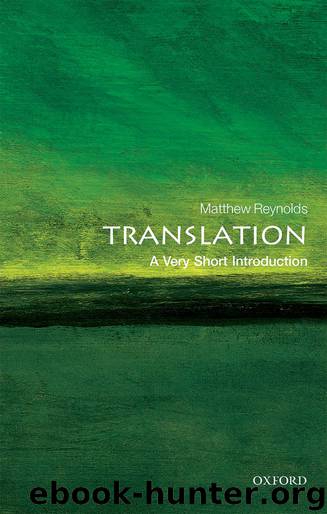Translation: A Very Short Introduction by Matthew Reynolds

Author:Matthew Reynolds
Language: eng
Format: epub
ISBN: 9780191020100
Publisher: OUP Oxford
Published: 2016-08-20T04:00:00+00:00
Words of God
New Zealand was not the only place where English Bibles (themselves, of course, translations) were being translated into other languages. Many other missionaries, in many other countries, were trying to spread the good news via translation; and they are still doing it today. An American evangelical website claims that the Bible has been fully translated into 500 languages and partially into another 1,300; translation projects are apparently getting started in a further 2,300. It is an amazingly ambitious endeavour. Many of these languages were (or are) oral: in them, the Bible was (or will be) not only the first book ever translated, but the first written and printed book full stop.
When language is given letters and a written grammar for the sake of Bible translation, the results can be peculiar. In Malaysia, in the early 1800s, the writer Abdullah bin Abdul Kadir Munsyi came across Bible translations that had been done by the Dutch preacher and doctor Melchior Leydekker nearly a century before. Leydekker had used first Roman and then Arabic letters to represent Malay speech. A skilled linguist, Abdullah found he could read the words easily, even though this was the first time he had seen Malay represented in print. But the punctuation and idiom felt wrong to him: ‘it all sounded very clumsy to my ear, and I was inclined to say: “this is a book of the white man” ’.
Nowadays, missionaries tend to be anxious to avoid the sort of awkwardness that troubled Abdullah bin Abdul Kadir Munsyi. The dominant theorist of missionary translation, Eugene Nida, recommends the use of anything that sounds natural in the receiving language, with the cultural and doctrinal specifics of the Bible text being downplayed accordingly. In the Bamabra language of West Africa, the English word ‘redemption’ should be translated with a term that literally means something like ‘God took our heads out’ (i.e. from the iron collar of slavery). In contemporary America, the phrase that appears in the King James Bible as ‘salute one another with a holy kiss’ should become ‘give each other a hearty handshake all round’.
Missionaries can adopt this permissive practice of translation because they feel that their whole enterprise is divinely sanctioned. Their job is not so much to give readers a precise understanding of the holy text as to persuade them to join a community of believers. As one historian of the movement puts it: ‘accessibility has been counted more significant than the distortion which goes with it’, the reason being that translation of the Bible, however loose, ‘has almost always resulted in net gain for people who wanted access to it’ (the times when it did not produce ‘net gain’ are not explored).
But ‘distortions’—or ‘shifts’, to use the more usual word—in Bible translations can matter hugely when they encapsulate differences in doctrine. The Baptist William Carey was a prolific translator of the Bible into Bengali, Sanskrit, and other Indian languages in Calcutta in the late 18th and early 19th centuries. But he incurred the
Download
This site does not store any files on its server. We only index and link to content provided by other sites. Please contact the content providers to delete copyright contents if any and email us, we'll remove relevant links or contents immediately.
Housekeeping by Marilynne Robinson(4434)
Papillon (English) by Henri Charrière(4252)
The Poetry of Pablo Neruda by Pablo Neruda(4090)
World without end by Ken Follett(3472)
TCP IP by Todd Lammle(3177)
Fluent Forever: How to Learn Any Language Fast and Never Forget It by Gabriel Wyner(3077)
The Rape Of Nanking by Iris Chang(2809)
How Proust Can Change Your Life by Alain De Botton(2801)
The Alchemist by Paulo Coelho(2684)
The Partner by John Grisham(2394)
Two lives by Helen Naylor(2296)
Hitler by Ian Kershaw(2193)
Yerma by Federico García Lorca(2062)
Sophie's World by Jostein Gaarder(2013)
Smilla's Sense of Snow by Peter Hoeg(1932)
Merriam-Webster's Pocket Dictionary by Merriam-Webster(1929)
Twilight of Idols and Anti-Christ by Friedrich Nietzsche(1888)
Il cavaliere inesistente by Italo Calvino(1852)
Deep Writing by Eric Maisel(1814)
